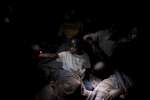- Text size
 |
|  |
|  |
| 
- Français
Refugee return is the spark of hope in the Great Lakes
News Stories, 6 January 2006

KINSHASA, Jan 6 (UNHCR) – A few women are chatting excitedly at the UNHCR Kiliba assembly point north of Uvira in the Democratic Republic of the Congo's (DRC) South Kivu province. "I received a letter from family members back home saying that things got better," says one. "Now I want to return."
They are Rwandan refugees considering returning back to their community "collines," or hillsides, in Rwanda after over 10 years of refuge in the dense forests of the Kivu provinces in eastern DRC. A few kilometres south in Uvira and further down in Baraka, residents are becoming accustomed to seeing emotional reunions of Congolese returning from camps in Tanzania, especially at UNHCR's bustling transit centres.
In 2005, the DRC has been at the centre of movements of refugees returning home, crossing the country's borders in various directions. While over 46,000 Congolese refugees returned to DRC in 2005 from Tanzania and the Central African Republic, the UN refugee agency also helped almost 9,000 Angolan, 238 Burundian and almost 7,000 Rwandan refugees return home from DRC after long periods in exile.
"There is no more war," says former refugee Vandamu Kamu, who returned to Baraka, DRC from Tanzania in December 2005 on the UNHCR repatriation ferry MV Mwongozo. "Where the bush took over after years of neglect, we are going to work hard," he vowed.
Despite all the challenges in South Kivu – including war-damaged infrastructure and the presence of renegade militia groups – the province has become the site of solutions to a long-standing humanitarian crisis in the Great Lakes region.
The Kivus have witnessed many convulsions of history over the last decade. In the aftermath of the 1994 Rwandan genocide, more than a million Rwandan Hutus fled here and UNHCR established camps of unprecedented size. Two years later, under attack from Rwandan government forces, many Rwandan refugees streamed back home in a silent column kilometres long, while others fled into the Kivus' dense forests.
Some of these – like the women at the Kiliba assembly point – are just now, a decade later, coming out of hiding to return home. Since 2000, the UN refugee agency has been reaching out to these Rwandan refugees in the forests with a system of assembly points in remote areas, where they can get new clothing, a hot meal and transportation home.
Over the past five years almost 81,000 Rwandan refugees have returned to Rwanda from eastern DRC with UNHCR's assistance, including more than 7,000 in 2005 alone. The operation will continue in 2006 to reach out to the 50,000 Rwandan refugees still believed to live in the Kivu forests.
Meanwhile, in South Kivu, Yoali Mwanuke, formerly a Congolese refugee in Tanzania who returned home two months ago, balances on her head a bundle of food wrapped in a colourful piece of cloth and shares her enthusiasm for the future of her province.
"My return will bring change for my country," she says. "I am going to work for peace and the development of agriculture in Baraka."
She is one of some 300,000 Congolese refugees who fled violent conflict in eastern DRC between 1997 and 1999. Relative calm returned to North and South Kivu provinces with the signature of the Lusaka ceasefire in 1999 and the deployment of UN peacekeeping forces known as MONUC, though localized conflicts sometimes still flare up.
"Indeed, the security is improving as foreign armed groups have been requested to return to their countries of origin," says MONUC spokesperson Kemal Saiki. "At the same time, we can see through increased refugee returns that confidence in the normalisation of the situation in the DRC is increasing – with 25 million voters registered, including a large number of former refugees who specifically returned to register," he added.
UNHCR started to facilitate refugee returns from Tanzania to Fizi and Uvira territories in DRC in October 2005, after refugees had already started coming home on their own, crossing Lake Tanganyika in flimsy boats.
"The decision to engage in organising cross-border return movements was foremost driven by the need to channel returns and to reduce the risks refugees are taking when embarking on wooden boats of dubious safety to cross Lake Tanganyika – Africa's deepest lake," UNHCR's representative in DRC Eusebe Hounsokou explains.
Over 18,000 refugees have come back with their own means to South Kivu since October 2004. UNHCR reacted first by setting up transit centres, registering returnees and by providing basic assistance and transport within South Kivu. When the overall conditions had significantly improved towards the end of 2005, facilitated return movements started. The MV Mwongozo, a sturdy ferry chartered specifically for the repatriation operation has since carried 6,303 Congolese refugees back home in safe and dignified conditions.
Sailings of the MV Mwongozo are scheduled to continue twice weekly over the coming months, allowing up to 1,000 refugees per week to finally return home.
But the region of return is desperately poor and local authorities are calling for basic services such as clean drinking water, health centres and schools as well as more development aid to help communities, including the returnees, revive and prosper.
"As the DRC as a whole is moving towards a conclusion of the Transition Process with democratic elections in 2006, South Kivu province is at crossroads," Hounsokou says. "Despite its history and persisting problems, the province is witnessing the end of forced displacement for thousands of refugees and internally displaced persons. The coming year will be decisive, and UNHCR will closely monitor the situation and adjust the repatriation programmes as required."
By Jens Hesemann in the Democratic Republic of the Congo













































